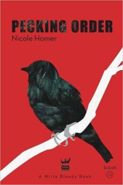
Review: Pecking Order by Nicole Homer
Reviewed by Linett Luna Tovar

Pecking Order
Poems by Nicole Homer
Write Bloody Publishing, April, 2017
$15.00, 100 pp.
ISBN-13: 978-1938912726
With fearlessness, intention, and humor, Nicole Homer’s Pecking Order explores the dark places many of us spend our lives avoiding. An intimate voicing of experiences surrounding motherhood, race, colorism, the body, and private/public spheres, these poems create space for both questions and affirmations.
The opening poem “The Overlap,” a reflection on miscarriages, speaks to Homer’s frankness and ability to draw connections in moments that may cause us to recoil. The piece allows for a distancing from the “it” forming in a uterus yet validates the mourning and sisterhood between the speaker and her subject. The speaker asserts, “Want and love are not the same word,” offering resonance to those who share in her experience of loss and insight for those of us who don’t.
Homer’s precision with narrative enables an organic intersectionality that encompasses a number of issues at once. In “Things Only a Black Mother Can Prepare You For,” we witness the racial profiling and harassment of young black men at the hands of a police officer. In “The Mother Offers Advice (Or, I Am Doing the Best I Can with What I Have),” Homer reflects on the “patrolling” of the “borders around blackness.” Other pieces walk us through the anger, hurt, and conflicting emotions that a mother with mixed race children experiences as she navigates both public and private space. Vacillating between dark and comical, the speaker in “The Woman Who Is Not the Nanny Answers the Grocery Store Concerning the, Evidently, Mismatched Children in and around Her Cart” “stabs” the stranger who mistakes her for a nanny. “Do you know hard it is to get the blood of strangers out of cotton?” she asks. And yet among friends and loved ones, race and gender dynamics are not any simpler. “Casual Racist” points to the prevalence of implicit racism in what are supposed to be spaces that hold and affirm us. “There is no safe place” the author concludes. Meanwhile, in “But if You Are a White Boy, Then My Father Was a White Boy, Too.” the speaker comments on her partnership with a white man: “The only thing I ever did worthy of the word traitor:/ love you but call you white boy / when you weren’t around.”
While gender, racism, motherhood, and violence have been explored before, the depth and perspective presented makes each poem refreshing. We witness Homer wrestling, raw and vulnerable, with the conflicts that surface in the her everyday reality. More than simply being persuaded, we are probed with questions: How much should a mother be consumed by her children? What was the life she gave up? How do you close the chasm between romantic partners of different racial backgrounds? Can you? Should you? How do I raise a child that can understand my struggle? How do I guard my child from the struggles I and many others experienced? What am I running away from? Without a doubt, mothers are likely to find deep resonance and comfort in its lines, but Pecking Order is rich enough to impact and challenge all readers.
Despite the many difficult questions and stories presented, there is hope in Homer’s lines. She assures mothers, “we are doing okay / we are doing what needs to be done” in “I Wish I Was More Mothers.” She reminds us, in “Threshold,” that it is only by facing these, our darkest monsters, that we can find ourselves:
I don’t want to go in
but it’s my house
and eventually I will run out of benches
out of sidewalks
out of other houses that I never belonged in.
Linett Luna Tovar is a San Gabriel Valley-based writer, performer, educator, and activist. Her work, which explores family, gender/sexuality, culture, [im]migration, and environmentalism, has been showcased in Twisted Vine Journal, Mt. SAC’s Left Coast Review, and Undeportable Productions media. She is currently working on a collaborative zine for young femmes of color and completing her MA in Latin American Studies.

Leave a Reply